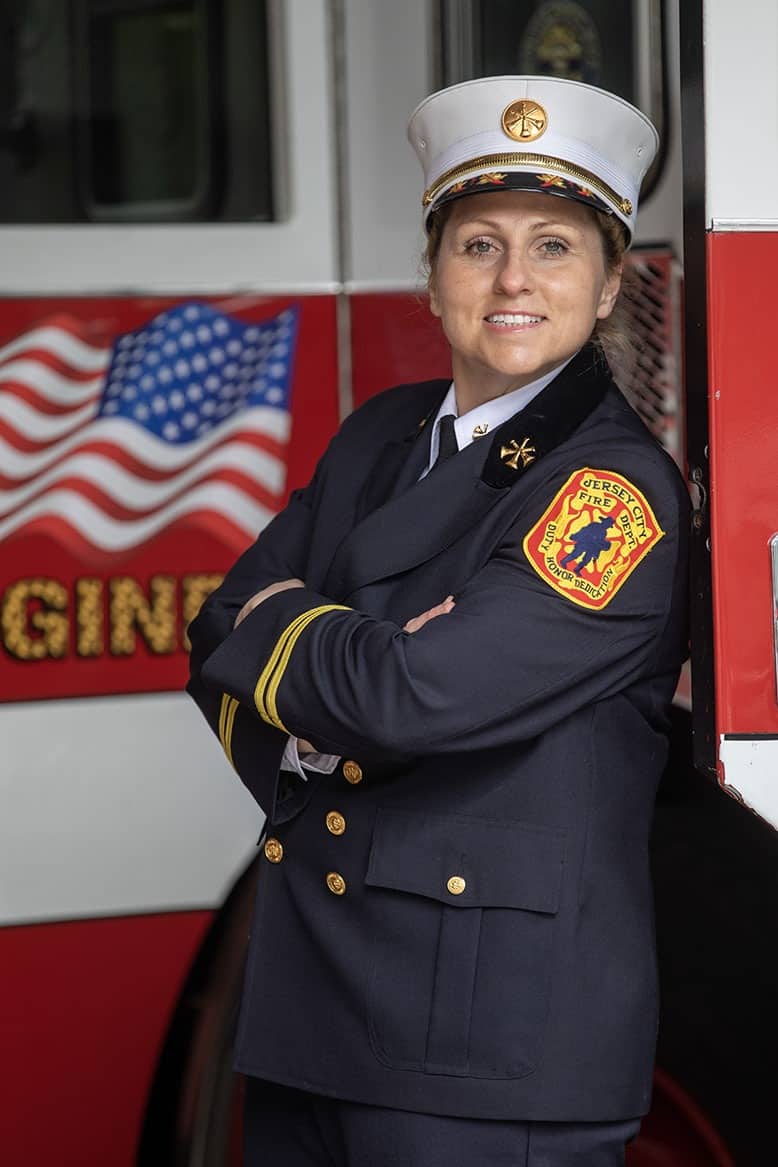
Constance Zappella became the first female deputy chief of the Jersey City Fire Department in November. Photo: Courtesy of Jennifer Brown/City of Jersey City
Firefighting is clearly a male-dominated profession, but that didn’t deter Constance Zappella. The Jersey City native, 44, is a graduate of Saint Peter’s College who rose through the ranks at the Jersey City Fire Department (JCFD) and is now that city’s and the state’s first female deputy chief. We asked Zappella about her job and how she made history.
The qualification exam is a competitive, timed, demanding test. How did you prepare?
I had been training for the test in college, running track and running up and down stairs with weights. I was in great shape for the test, which involved dragging a 165-pound dummy through an obstacle course while wearing a 45-pound vest and running up and down 12 flights of stairs. I did very well, coming out 24 out of 800 applicants.
What gave you the confidence you needed?
My mother was a strong female role model. My father died of cancer when I was 14, and my mother went back to nursing school. She raised five children, working nights. She supported us and worked hard.
Having a woman on the team was unusual. How did your colleagues react?
I never had a problem because I wasn’t afraid to work and I did my job. The guys who worked with me were very good to me and treated me like one of them. They taught me. I love my job, but I still have to prove myself every day. My sister knows how much I enjoy my job and she, too, joined the JCFD.
You have been assigned to training. What do you do?
We train every day. It’s the most important aspect of the job, because firefighting involves so many different facets, and training enables us to learn new skills and techniques to make our jobs safer. We need to know about building construction, how buildings collapse, and what paths smoke and fire spread in different types of buildings.
How did you accomplish your rise through the ranks?
Success in the fire service requires constant studying, training and doing. I put great time and effort into studying and continued my education by taking college-level fire science classes. As a firefighter, captain and battalion chief, I chose to work in the busiest fire companies and areas of the city, under the best and most experienced fire officers to gain experience and sharpen my skills.
You left a job [in the corporate world] that you called cutthroat and competitive, and said you prefer working as part of a team. Explain.
You cannot put a fire out by yourself. I work with good people [whom] I respect and trust. Every day in the fire service is different, and we never know what to expect. For instance, when Sully Sullenberger landed his plane in the Hudson, we were there assisting people getting off the ferry.
You rose to the top in your chosen field. What message does this send to other women who may want to enter a field that is nontraditional for women?
Women can do anything they want, but they have to want to do it. It’s not just something you do to prove a point. I realized that with everything you do, you get exactly what you put into it.
No one knows New Jersey like we do. Sign up for one of our free newsletters here. Want a print magazine mailed to you? Purchase an issue from our online store.
